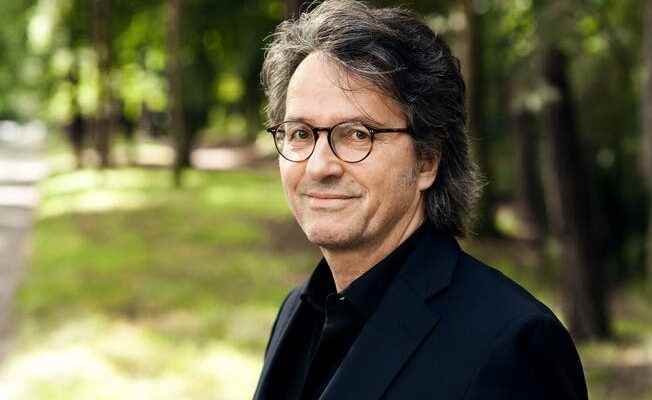In his new novel, the German author describes the life of a married couple who cannot get away from the war and do not know what to do with their pain and longing.
The number of novels and short stories dealing with the Second World War and the early post-war years can hardly be counted. However, Ralf Rothmann has recently impressively demonstrated with his very successful novels Die im Frühling (Die in Spring) and Der Gott dasses Sommers (The God of that Summer) that every time and every generation always makes attempts, indeed must undertake, to narrate epochal historical caesuras and their effects placed.
He hasn’t come to the end of it yet, because his new book – obviously based on the story of his parents again – draws on the arsenal of characters from the predecessors and makes it clear that forgetting is sometimes not possible, no matter how much you long for it : «Probably people who have been to war once are at war for life, and who have had to flee once are rootless forever.»
Rothmann der Melker Walter and his wife Elisabeth, known as Liesel, serve as examples of this bitter experience. After 1945, after 1945, they tried to gain a foothold after being in an unbreakable state of silence after their experiences in the war. Their story begins in northern Germany and ends in the Ruhr area, where the two die in quick succession in the mid-1980s.
Going stale in the province
It tells the story of Luisa, a childhood friend of Liesel, who makes a career as a library director, marries a much older lecturer and thus leads her own life in a middle-class milieu. After retiring in 2000, she decided to write a book about her friend and to explore the hidden moments of her biography.
The two women met after the end of the war when Liesel, who had fled West Prussia, was employed as a waitress in a naval casino in Kiel that Luisa’s parents ran. The drunken guests are enthusiastic about the new serving force, who is just sparkling with verve. It seems that she no longer wants to know anything about the past, never misses a pleasure and dreams of traveling to Paris. She is engaged to the milker Walter, who works near Schleswig, which does not prevent her from regularly inviting men to her room at night.
Rothmann’s novel is the tale of an exuberant longing and progressive disillusionment. Liesel fears nothing more than to languish at Walter’s side in the provinces and to eke out a life full of deprivation as a milkmaid. But her fear doesn’t help, the course of things doesn’t change, and when her friend, who has meanwhile become at home in the academic milieu, comes to visit, all that remains is a ruthless conclusion: “Ever since I can remember, even as a little girl, I wanted to go out out of the cow shit and the septic tanks to a real city full of life, like Stettin or Danzig with all the fairs and dance halls and nice houses and shops. I was happy then, that was life. And now look where I ended up.”
Ralf Rothmann is a master at capturing social milieus that are usually neglected in contemporary German literature. With an unbiased view, he shows a tedious everyday life – first in northern German stables and then, when Walter takes up the apparently more regulated profession as a charcoal cutter in the Ruhr area, in unadorned workers’ settlements, where one desperately tries to gain at least small joys from the omnipresent sadness. Even Liesel’s children, Wolf and Sonja, don’t manage to brighten up the arduous everyday life – especially since it is questionable whether Walter is even the biological father of the girl.
Her narrator Luisa makes it clear early on that Liesel’s greed for a boozy, carefree life is intended to cover up something that cannot be talked about: “I didn’t know much about Elisabeth’s life up to that point, and yet I sometimes had the feeling that she had a blank space in her carried around, a deep inner vacuum.”
What this blind spot is all about is elucidated in passages flashing back to the winter of 1945. Without Ralf Rothmann making any explicit connections to the later married life of Walter and Liesel, these memories of the last winter of the war reveal in a straightforward manner which will cloud, even corrode, Liesel’s psyche forever.
An abyss of unfulfilled
The sixteen-year-old farm worker’s child fell into the clutches of Russian soldiers, who raped her one after the other and severely damaged the girl’s body and soul. Rothmann reproduces this brutal desecration with an almost unbearable intensity. It has seldom been described so relentlessly how a life here completely falls apart within a few days. It is only thanks to the help of a Russian deserter that Liesel is able to heal from his physical injuries.
It’s no longer a secret that Ralf Rothmann is one of the great storytellers who doesn’t fit into any of the usual pigeonholes. “The Night Under the Snow” is one of his best books. Firmly rooted in the years it tells about, it captivates with its subliminal topicality. The only thing that can be argued about is whether Liesel’s son Wolf should have had a special appearance as a writer. It’s nothing more than a charming autobiographical note.
How can it be endured in the here and now, how can longings be dealt with that the course of time is not interested in? That’s what this novel asks. Or with Liesel’s deliberately flippant remark, which only conceals the abyss of the unfulfilled and damaged: “Oh, man, what could not have happened without this ol’ war.”
Ralf Rothmann: The night under the snow. Novel. Suhrkamp-Verlag, Berlin 2022. 304 pages, CHF 34.90.
